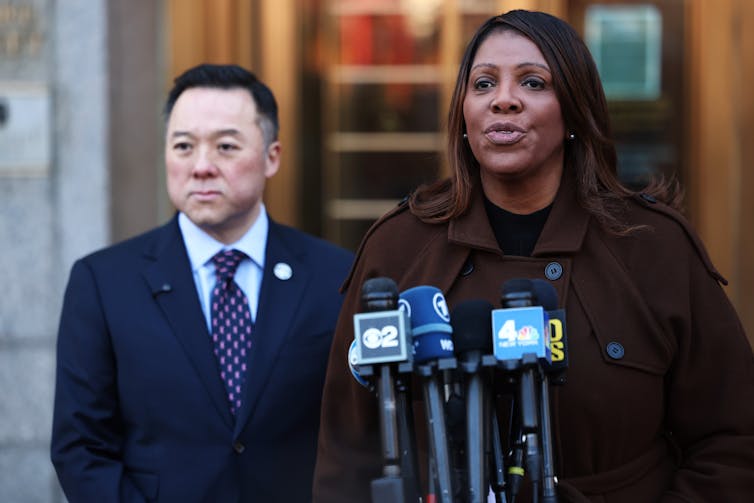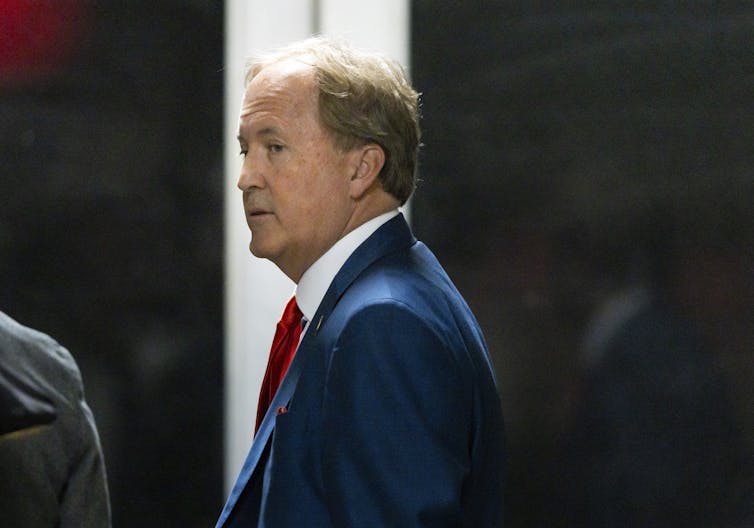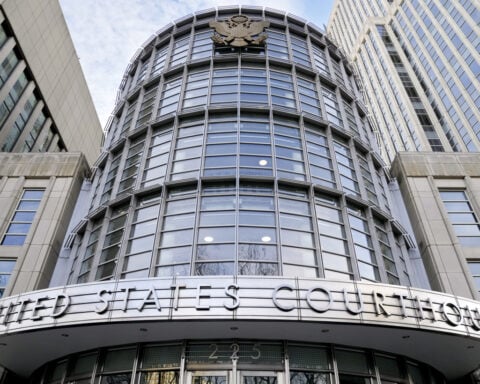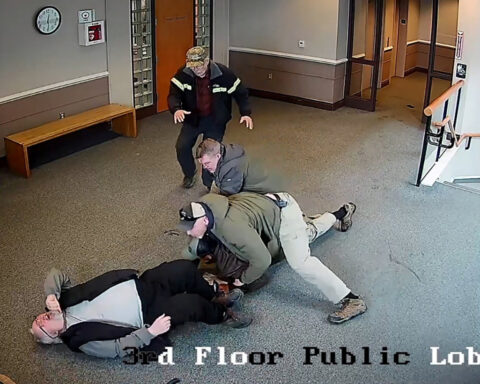The start of President Donald Trump’s second term has been a bonanza for the attorneys general of blue states. As the president has released his blizzard of executive orders and axed federal funding and programs on which states rely, these attorneys general have filed suits designed to put the brakes on what Trump is trying to accomplish.
As the Washington Post reported on Feb. 22, 2025, “In the past month alone, multistate coalitions have sued the Trump administration seven times.”
Here’s one example: In late January, 22 states and the District of Columbia asked a federal district court in Rhode Island for a temporary restraining order to stop the Office of Management and Budget from halting federal grants and financial assistance that would go to residents, organizations or governmental entities in their jurisdictions.
In early February, the attorneys general of Minnesota, Oregon and Washington sought and were granted an order to stop the Trump administration from implementing an executive order that, according to Lambda Legal, an LGBTQ+ rights advocacy group, “targets transgender and gender-diverse youth.”
Almost a week later, 14 attorneys general went to court to prevent Elon Musk “from issuing orders to any person in the Executive Branch outside of DOGE and otherwise engaging in the actions of an officer of the United States.”

New York Attorney General Letitia James and Connecticut Attorney General William Tong both sued to stop DOGE from obtaining Americans’ personal data.
As a student of law and politics, I see the attorneys general actions against the Trump administration as the latest chapter of an ongoing story dating to the 19th century in which state officials push back against the national government, breathing life into this country’s federal system. That system, designed by the framers to protect liberty and as a guard against tyranny, gave powers to both federal and state governments.
Hybrid role of state attorneys general
The work of attorneys general in the various states involves a mix of law and politics. As the National Association of Attorneys General describes their role, attorneys general are “chief legal officers” and serve “as counselor to state government agencies and legislatures, and as a representative of the public interest.”
Attorneys general use the law to advance their political goals. Though their precise duties vary from state to state, state attorneys general do not completely eschew politics.
In 43 states, they are elected officials who run for office as partisans. These candidates offer programs and promise to take actions that are typically in line with the platforms of the parties that nominate them. As attorney Marissa Smith wrote in the Cornell Law Review, “The position of State AG has long been said to stand for ‘Aspiring Governor’ rather than Attorney General.”
Smith argues that state attorneys general “have leaned into our nation’s divisive partisanship – often as an integral part of a quest for higher office – and used their traditional roles and powers to grandstand and showcase their party loyalty on a national stage.”
When, as in the recent spate of suits, state attorneys general pursue the federal government or another target on the national stage, there’s really no way for them to lose, politically speaking. As journalist Alan Greenblatt writes, “It’s all upside. If a lawsuit succeeds, you achieve a policy goal. If it fails, you’ve still made a name for yourself and often delayed a policy for months and even years,” especially when that policy is unpopular.
Suing the federal government
There is nothing new about what state attorneys general are now doing. At one time or another, lawsuits against the federal government have come from both Democratic and Republican attorneys general.
For example, during the so-called Gilded Age at the end of the 19th century, because of their “unique institutional position,” progressive state attorneys general “were able to serve as opportunity points for the expression of the ‘public interest’ in the absence of administrative mechanisms or actions by other political institutions,” political scientist Paul Nolette writes.
These attorneys general sued railroad companies and other big businesses, seeking to get state courts to rein in the growing power of what were called at the time “robber barons.”
As the New Deal unfolded in the 1930s, some Republican state attorneys general tried to resist what they saw as federal government encroachment on state power, though the primary opposition to the New Deal came from other political actors.
After the Supreme Court’s 1954 Brown v. Board of Education decision ordered the desegregation of schools, a few Southern Democratic state attorneys general were involved in organizing “massive resistance” in the region, by offering legal advice to state officials opposed to the Brown decision and defending segregation in court.
In the 1980s, state attorneys general banded together to sue federal agencies for failing to enforce the law or to implement acts of Congress, including those concerning the deregulation of industry. A decade later, they launched a concerted campaign of lawsuits against major tobacco companies because the federal government was not, they alleged, adequately regulating the tobacco industry.
And when Barack Obama entered the White House, state attorneys general enthusiastically embraced the role of watchdog and nemesis. Republican state attorneys general led the resistance with lawsuits over health policy, immigration and environmental regulations, using their powers much like their Democratic counterparts are doing today.

Texas Attorney General Ken Paxton claims to have sued the Obama administration 100 times.
Former West Virginia Solicitor General Elbert Lin, who served as the chief litigator in his state’s attorney general’s office, tells the story this way: “During the eight years of the Obama Administration, states led mostly by Republican attorneys general made it a priority, early and often, to challenge President Obama’s initiatives.”
One of them, Texas’ Greg Abbott, sued the Obama administration 31 times, at one point describing his job this way: “I go into the office, I sue the federal government, and I go home.”
During the first Trump administration, Democratic attorneys general continued what had happened under Obama. They filed 138 multistate lawsuits, up from the 78 times Republicans sued the Obama administration.
And at the end of President Joe Biden’s term, Ken Paxton, Texas’ Republican attorney general, issued a press release saying that over the previous four years, he had sued the administration 100 times, calling it “an historic milestone.”
‘Expect to be sued’
Supreme Court Justice Louis Brandeis once called states “laboratories of democracy.” More recently, Jeffrey Rosen of the National Constitution Center praised federalism for continuing “to promote ideological diversity” in an increasingly polarized nation.
That diversity has long been on display in what state attorneys general have done on the national stage.
Today, when some worry that the U.S. constitutional system is breaking down, state attorneys general are trying to realize the founders’ vision of limited government. They are mobilizing legal tools to vindicate legal claims while also using the courts for political purposes.
All presidents should expect to be sued early and often by state attorneys general of the opposite party. But as attorney Jeffrey Toobin writes in The New York Times, “political victories matter more, and last longer, than court cases” in the United States.
In recent years, suits brought by state attorneys general have protected the rights of immigrants, defended reproductive rights and asserted state prerogatives in many areas. But while these lawsuits have an important role to play in America’s constitutional system, what citizens do is more important.
Even successful litigation by state attorneys general typically brings only a one-time victory, but political action is needed to sustain what they achieve in court. And their work cannot be done without the support of the citizens they serve and who, by and large, elect them.

Austin Sarat does not work for, consult, own shares in or receive funding from any company or organization that would benefit from this article, and has disclosed no relevant affiliations beyond their academic appointment.
Source: The Conversation

 Trump has begun another trade war. Here's a timeline of how we got here
Trump has begun another trade war. Here's a timeline of how we got here
 Canada's leader laments lost friendship with US in town that sheltered stranded Americans after 9/11
Canada's leader laments lost friendship with US in town that sheltered stranded Americans after 9/11
 Chinese EV giant BYD's fourth-quarter profit leaps 73%
Chinese EV giant BYD's fourth-quarter profit leaps 73%
 You're an American in another land? Prepare to talk about the why and how of Trump 2.0
You're an American in another land? Prepare to talk about the why and how of Trump 2.0
 Chalk talk: Star power, top teams and No. 5 seeds headline the women's March Madness Sweet 16
Chalk talk: Star power, top teams and No. 5 seeds headline the women's March Madness Sweet 16
 Purdue returns to Sweet 16 with 76-62 win over McNeese in March Madness
Purdue returns to Sweet 16 with 76-62 win over McNeese in March Madness








